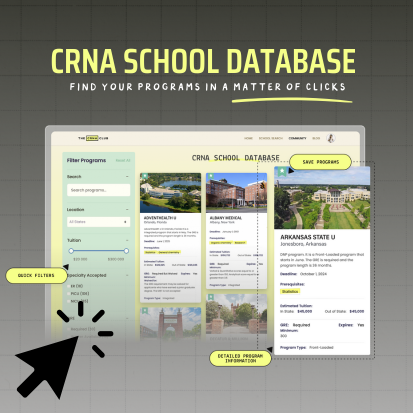It’s 6:45pm. The cursed time when inevitably all bad things happen, 15 minutes before shift change.
Your patient who has been the MOST chill all day decides he wants to sundown and pull out his ETT.
Crap.
You call out for help, and an overhead page later someone shows up at your patient’s door.
You’ve put a non-rebreather on the patient and despite cranking up that O2 your patient’s sat is hovering at 79%.
This cool as a cucumber, knight in shining armor (ok, ok, I’ll tone it down a bit) asks you what the patient’s K+ level is, pushes some drugs, and slides that sweet, sweet ETT back where it should be. You breathe a sigh of relief and glance at the doctor’s name badge.
Wait, not a doctor. “Certified Registered Nurse Anesthetist”.
Whoa. I didn’t know nurses could intubate.
Yep. And that’s just the tip of the iceberg, friend.
Certified Registered Nurse Anesthetists are advanced practice nurses with a graduate-level degree in nursing, providing anesthesia with a significant amount of autonomy. There are over 100 CRNA schools across the United States, and now, all programs have transitioned to Doctorate-level programs (DNAP or DNP). To practice as a CRNA, one must (at a minimum) have a Bachelors of Science in Nursing (BSN) from an accredited nursing school and have critical care experience. CRNAs work independently in many states, and are the sole anesthesia providers in many rural hospitals, as well as in the military.
Is Becoming A CRNA Worth It?
The road to becoming a CRNA is not easy, but, as a practicing CRNA, I can tell you that it (for me) was 1,000% worth it, and I’d do it again in a heartbeat. Most of my colleagues feel the same way.
Yes, you have to go through many, many years of training.
Yes, you likely will have to take out loans to pay for the program.
Yes, you’ll be missing a LOT of life while you’re in school.
Why not become an acute care nurse practitioner? Or a clinical nurse specialist? I think the answer comes down to, how much do you like balancing multiple patients at a time. All advanced practice nurses exhibit excellent critical thinking skills. However, CRNAs are able to focus on one patient at a time, and really dive deep into analyzing how to provide the best anesthetic for one patient at a time.
BUT. I’m going to get down to the nitty gritty and tell you exactly why I think becoming a CRNA is worth it. So if you’re on the fence, read on.
Becoming a CRNA is worth it for several reasons:
- Better compensation allows many to work less.
- Flexibility to work a wide range of shifts: 8 hr, 10 hr, 12 hr, 16 hr, 24 hr shifts depending on where you work.
- More autonomy. CRNAs can work independently in many states (known as opt-out states, meaning they are “opting out” of MD supervision).
- More critical thinking, less physically demanding. No more bed baths on BMI of 50 patients.
- Ability to do advanced procedures like peripheral nerve blocks, as well as invasive lines.
CRNAs are the highest paid nursing specialty when compared to other career paths like nurse practitioners. According to the Bureau of Labor Statistics (BLS) in 2021 Certified Registered Nurse Anesthetists made a mean of $202,470. That number can increase quite a bit (think around 300k) if you work in a rural location, or a place where the demand is high. Locums CRNAs as well as 1099 CRNAs also make quite a bit more. With smart choices, paying back student loans is achievable, and something many of us are able to do fairly quickly. You’ll even find that some employers are willing to offer loan repayment assistance, pretty sweet.
Top paying states for CRNAs
According to the Bureau of Labor Statistics, as of May 2021, the best paying states (mean wages) for CRNAs were as follows:
- Connecticut: $276, 540
- New Jersey: $263,850
- Illinois: $250,280
- West Virginia: $247,650
Benefits of being a CRNA
Immense autonomy
There are a TON of benefits to becoming a CRNA. First up, the autonomy. As the anesthetic provider, you have the ability to decide what drug to give and when. You don’t need to run it by anyone, or get an order. You want to give a vasopressor? Go for it. You want to give blood? Sure. You have the training, education, and experience to make that call. But of course, that also means you have to live with the consequences of your decision.
Critical thinking skills on point
Secondly, if you love critical thinking, you’ll love being a CRNA. There’s a lot to consider with every anesthetic. First, the patient. Next, the type of surgery. Then, the surgeon. Now, put all those three together and think about every possible scenario that could go wrong. Yikes.
Individualized patient care vs. 5 at once
The third benefit of being a CRNA is that you get to focus on one patient at a time. No more hustling between rooms doing a juggling act. You get to give 100% of your attention to the patient on the table, trusting you with their life.
The real MVP decision makers
As a CRNA, you are the decision maker. If a patient is not optimized for a procedure, and it is not safe for them to undergo anesthesia, you have the power to cancel the case. Depending on your place of practice, you have the ability to decide the type of anesthetic. You want to do a spinal anesthetic vs. a general anesthetic? That’s your call. If you’d rather do a nerve block and sedation vs. puting the patient to sleep, you can do it! CRNA’s are extremely respected in the operating room, and often are the go-to decision makers.
Freedom: lifestyle + financial
Becoming a CRNA allows not only for a better chance at financial freedom, but lifestyle freedom as well. CRNAs can work in a variety of locations, from major teaching hospitals, to endoscopy centers, to pain clinics- basically, anywhere anesthesia is needed. There are many positions out there where you work no call, no holidays, or weekends (what a dream!). Just as RNs can choose what type of setting they want to work at, CRNAs can also decide what type of position they want. If a CRNA wants to make a higher salary, but take more call, or work longer hours, they can. If a CRNA has a family and values their weekends and doesn’t want to take call, they can choose more of a “lifestyle” position, too. There’s something for everyone.
Overall, becoming a CRNA is totally worth it. Of course, I’m a CRNA myself, so I’m biased. CRNAs love autonomy, and love the critical thinking that our job entails (of course, the compensation isn’t so bad either). So if you love those two things, you’ll love being a CRNA. I know the road to becoming a CRNA is challenging, but if it’s truly something you want, I can promise you, it’s worth it.
Watch our free 30 minute masterclass where we teach you things to avoid, what boxes to check, and how to become a stand out applicant!



